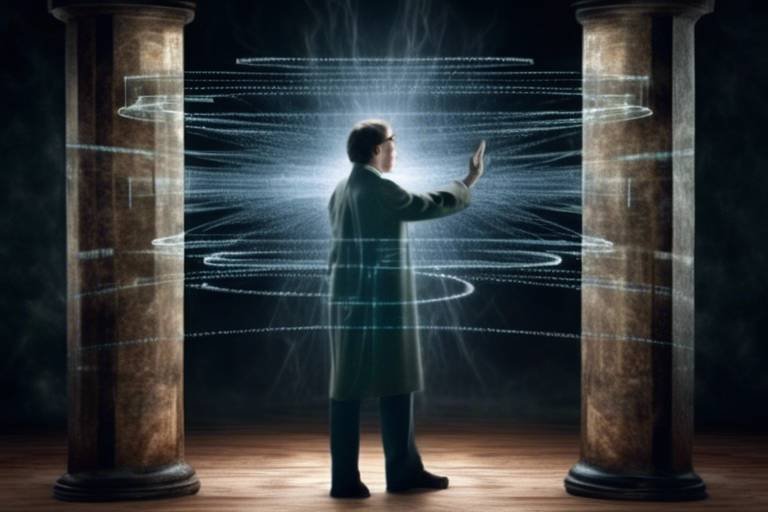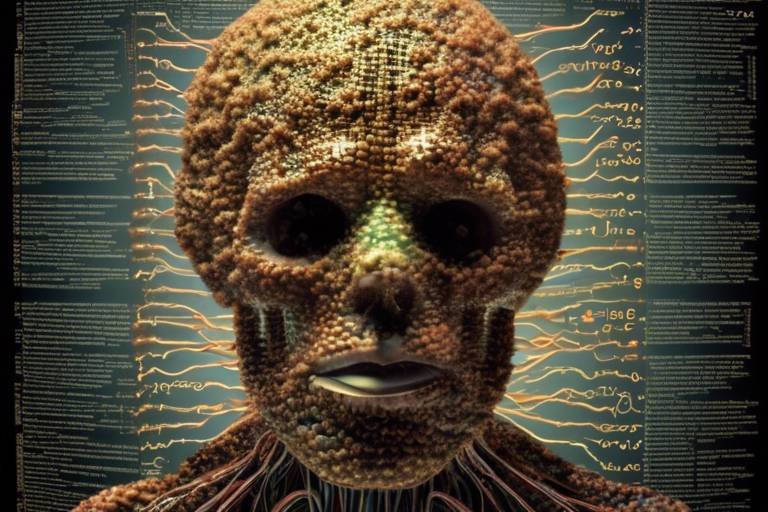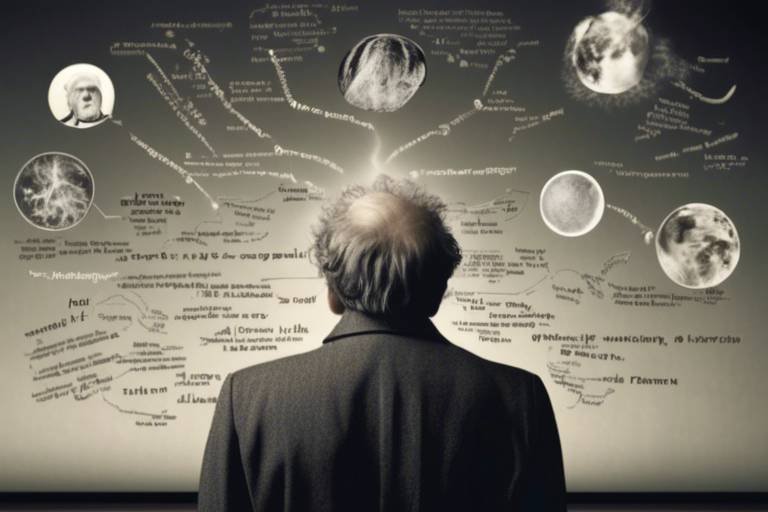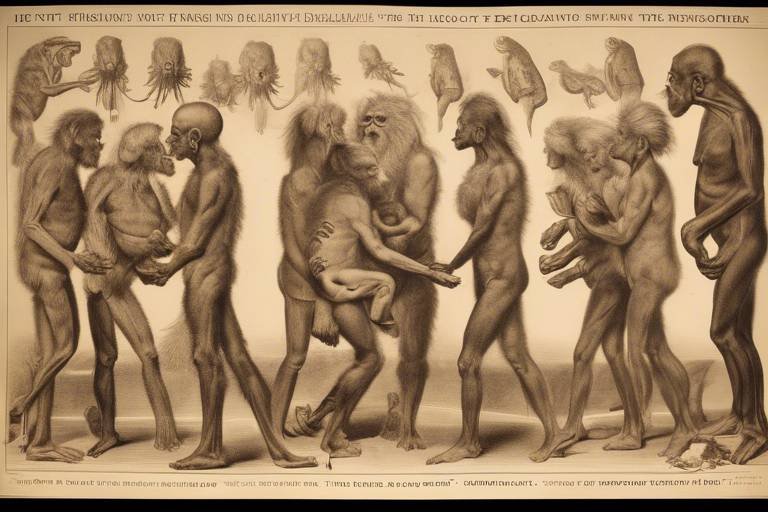Teleportation - The Philosophy behind the Science
Teleportation is a concept that has fascinated humanity for decades, primarily through the lens of science fiction. Imagine a world where you could instantly travel from one place to another, leaving behind the constraints of time and space. This notion, once relegated to the pages of novels and the frames of movies, has now found its way into serious scientific discussions. But what does this mean for our understanding of reality and existence? In this exploration, we will delve into the intriguing intersection of teleportation and philosophy, examining how this groundbreaking idea challenges our perceptions of matter, energy, and even consciousness.
At its core, teleportation raises profound questions: If we can transmit information about a person or object instantaneously, what does that say about the nature of identity? Are we merely a collection of atoms and molecules that can be rearranged at will? These questions not only provoke thought but also invite us to reconsider our understanding of what it means to be human. As we journey through the scientific foundations and philosophical implications of teleportation, we will uncover the layers of complexity that make this topic both exciting and essential for the future of science and ethics.
As we venture into this uncharted territory, it’s crucial to understand that the implications of teleportation extend far beyond the realm of physics. They touch upon ethical dilemmas, societal changes, and even our very sense of self. What happens when we can be in two places at once? Or when our consciousness can be transferred instantaneously? These are not just hypothetical scenarios; they are questions that we must grapple with as we stand on the precipice of a new era in understanding existence itself.
In the sections to follow, we will dissect the scientific principles that underpin teleportation, explore the philosophical ramifications, and consider the ethical challenges that come with such a radical shift in our perception of reality. So, buckle up as we embark on this thrilling journey through the philosophy behind teleportation—where science meets the profound questions of existence.
Teleportation, as a concept, has evolved significantly since its inception in science fiction. The idea that one could disappear from one location and reappear in another in the blink of an eye has captured the imaginations of many. Initially, it was a fanciful notion, often depicted in movies and books, where characters would beam themselves up to avoid danger or travel across galaxies. However, as scientific inquiry has advanced, teleportation has transitioned from mere fantasy to a topic of serious scientific discourse.
This transition raises fundamental questions about the nature of matter and energy. If teleportation were possible, it would imply that the fabric of reality is far more complex than we currently understand. It challenges the traditional concepts of distance and communication, suggesting that our universe may be interconnected in ways we have yet to comprehend. As we explore the scientific foundations of teleportation, we will uncover the principles that could one day make this extraordinary phenomenon a reality.
The scientific exploration of teleportation is rooted in the principles of quantum mechanics, a field that governs the behavior of particles at the atomic and subatomic levels. Quantum mechanics introduces concepts like superposition and entanglement, which are crucial for understanding how teleportation might work. In essence, teleportation could allow for the transfer of information about a particle's state from one location to another without the particle itself traversing the space between them. This is where the magic of quantum mechanics comes into play.
Quantum mechanics is often described as the science of the very small, dealing with particles that are smaller than atoms. It operates on principles that defy our everyday experiences. For instance, particles can exist in multiple states at once (superposition) until they are observed, at which point they 'collapse' into one state. This strange behavior is foundational to the concept of teleportation, as it implies that information can exist in a state of flux, potentially allowing it to be transmitted instantaneously across distances.
Now, let’s dive into quantum entanglement, a phenomenon where two or more particles become linked in such a way that the state of one particle instantly influences the state of another, regardless of the distance separating them. This challenges our traditional notions of communication and distance, suggesting that information can be shared instantaneously. In the context of teleportation, entanglement could be the key to transferring the information necessary to recreate an object or person at a different location.
Recent advancements in quantum teleportation have shown promising results. Scientists have successfully teleported information between particles over increasing distances. For instance, researchers have demonstrated quantum teleportation with photons and atoms, paving the way for potential applications in quantum computing and secure communication. These breakthroughs not only push the boundaries of what is scientifically possible but also spark further inquiry into the implications of such technology.
As we explore the scientific underpinnings of teleportation, it’s essential to consider the philosophical questions it raises. What does it mean for our identity if we can be replicated or transmitted across vast distances? Are we merely the sum of our parts, or is there something more profound that defines our existence? These questions prompt deeper reflections on consciousness and the essence of being, challenging our understanding of what it means to be human in an increasingly complex universe.
With great power comes great responsibility, and the potential for teleportation technology raises significant ethical dilemmas. Issues of safety, consent, and the potential for misuse must be carefully examined. For example, if teleportation technology were to fall into the wrong hands, it could lead to catastrophic consequences. Furthermore, the implications for personal identity and societal structures cannot be understated, as we navigate the uncharted waters of this revolutionary technology.
Teleportation may alter our understanding of personal identity in profound ways. If we can be duplicated or transmitted, what happens to the original? Are we still the same person, or do we become a different entity altogether? This raises questions about continuity and the essence of being, forcing us to confront the very nature of our existence.
Lastly, the societal implications of teleportation could be transformative. Imagine a world where transportation is instantaneous, fundamentally changing our economies, interpersonal relationships, and even our definitions of community. However, such changes also come with challenges that we must be prepared to address, ensuring that the benefits of teleportation are equitably distributed across society.
- What is teleportation? Teleportation is the theoretical transfer of matter or information from one point to another without traversing the physical space between them.
- Is teleportation scientifically possible? While teleportation has been demonstrated at the quantum level, practical applications for larger objects or humans remain theoretical.
- What are the ethical concerns surrounding teleportation? Ethical concerns include issues of safety, consent, identity, and potential misuse of the technology.
- How does teleportation affect personal identity? Teleportation challenges our understanding of identity, raising questions about continuity and the essence of being.
- What are the societal implications of teleportation? Teleportation could revolutionize transportation, economics, and interpersonal relationships, but it also presents significant challenges.

The Concept of Teleportation
Teleportation, a term that once resided solely within the realm of science fiction, has gradually made its way into serious scientific discourse, captivating the imagination of both researchers and enthusiasts alike. Imagine a world where you could step into a machine and, in the blink of an eye, find yourself on the other side of the globe. This concept, while seemingly fantastical, raises profound questions about the very nature of matter and energy. But what exactly is teleportation? At its core, teleportation refers to the instantaneous transfer of an object or information from one location to another without traversing the physical space in between.
The origins of the idea can be traced back to classic science fiction narratives, where characters would often vanish from one place and reappear in another, leading to thrilling plot twists and mind-bending scenarios. However, as our understanding of physics has evolved, the concept has transitioned from mere fantasy to a topic of serious scientific investigation. The implications of teleportation extend beyond just travel; they challenge our fundamental perceptions of reality and existence.
In scientific terms, teleportation hinges on the principles of quantum mechanics, a field that delves into the behavior of particles at the smallest scales. This is where things get particularly fascinating. The idea of teleportation forces us to reconsider what we understand about identity and continuity. If a person were to be teleported, would they remain the same individual, or would something essential be lost in the process? This philosophical inquiry intertwines with the scientific exploration of teleportation, creating a rich tapestry of questions that provoke deep thought.
As we delve deeper into the mechanics of teleportation, we must also acknowledge the ethical considerations that accompany such advancements. The potential for misuse of teleportation technology raises alarms about safety and consent. Who controls the teleportation technology? How do we ensure that it is used responsibly? These questions echo the dilemmas faced during the dawn of other groundbreaking technologies, such as the Internet and artificial intelligence.
In summary, the concept of teleportation serves as a bridge between the realms of science and philosophy. It beckons us to explore not only the scientific principles that may one day make it a reality but also the profound implications it holds for our understanding of existence, identity, and the ethical frameworks we must establish to navigate this brave new world. As we continue to explore the scientific foundations of teleportation, we will uncover the intricate dance between particles, energy, and the very essence of what it means to be human.
- What is teleportation? Teleportation is the instantaneous transfer of matter or information from one point to another without traversing the space in between.
- Is teleportation scientifically possible? While teleportation has been demonstrated at the quantum level, practical teleportation for larger objects or humans remains theoretical.
- What are the philosophical implications of teleportation? Teleportation raises questions about personal identity, continuity, and the nature of reality.
- What ethical considerations surround teleportation? Issues of safety, consent, and potential misuse are significant ethical concerns regarding teleportation technology.

Scientific Foundations of Teleportation
Teleportation, once a mere fantasy confined to the pages of science fiction, has evolved into a serious subject of scientific inquiry. At its core, teleportation challenges our fundamental understanding of matter and energy, pushing the boundaries of what we consider possible in the physical world. But what exactly lays the groundwork for this fascinating concept? To grasp the scientific foundations of teleportation, we must delve into the realms of quantum mechanics and quantum entanglement.
Quantum mechanics is the branch of physics that deals with the behavior of matter and energy at the smallest scales—essentially, the building blocks of our universe. It introduces a world where particles can exist in multiple states at once, a phenomenon known as superposition. Imagine flipping a coin; until you look at it, it’s both heads and tails at the same time. This bizarre nature of particles leads to the concept of teleportation, where the state of a particle can be transferred from one location to another without traversing the space in between.
One of the most mind-boggling aspects of quantum mechanics is the idea that particles can be interconnected in ways that defy classical physics. This is where quantum entanglement comes into play.
Entanglement occurs when two or more particles become linked, such that the state of one particle instantly influences the state of another, regardless of the distance separating them. Think of it like a pair of magic dice; roll one, and the other immediately shows the same number, no matter how far apart they are. This peculiar connection raises profound questions about the nature of distance and communication between particles. In the context of teleportation, entangled particles can be manipulated to transfer information instantaneously, potentially allowing for the teleportation of matter itself.
To illustrate, let's consider a simplified table that outlines the distinctions between classical communication and quantum entanglement:
| Aspect | Classical Communication | Quantum Entanglement |
|---|---|---|
| Speed | Limited by the speed of light | Instantaneous |
| Distance | Distance matters | No distance limitation |
| Information Transfer | Sequential | Simultaneous |
As researchers continue to explore the principles of quantum mechanics and entanglement, significant advancements have been made in the field of teleportation. Experiments conducted in laboratories around the world have successfully teleported quantum states over increasing distances. For instance, in recent studies, scientists have achieved teleportation of photons and even small particles, demonstrating the feasibility of the concept. These breakthroughs not only enhance our understanding of quantum physics but also open doors to potential applications in quantum computing and secure communication.
However, the journey of teleportation from theory to reality is still in its infancy. The complexity of the processes involved and the challenges of maintaining entangled states over long distances pose significant hurdles. Yet, the continued dedication of scientists in this field is paving the way for a future where teleportation might not just be a dream but a practical reality.
In summary, the scientific foundations of teleportation are deeply rooted in the principles of quantum mechanics and entanglement. As we unravel these mysteries, we inch closer to understanding not just how teleportation might work, but also the profound implications it could have on our perception of reality itself.
- What is teleportation? Teleportation is the process of transferring matter or information from one location to another without traversing the space in between.
- How does quantum mechanics relate to teleportation? Quantum mechanics provides the framework for understanding how particles behave at the smallest scales, including phenomena like superposition and entanglement that are essential for teleportation.
- What is quantum entanglement? Quantum entanglement is a phenomenon where two or more particles become interconnected, allowing the state of one to instantly affect the state of another, regardless of distance.
- Is teleportation currently possible? While teleportation of quantum states has been achieved in laboratory settings, teleporting larger objects or humans remains a theoretical concept at this stage.

Quantum Mechanics Explained
Quantum mechanics is a fascinating branch of physics that dives deep into the behavior of particles at the tiniest scales imaginable. Imagine a world where the rules we take for granted—like the predictability of a rolling ball—don't apply. In this peculiar realm, particles can exist in multiple states at once, a phenomenon known as superposition. This concept can be mind-boggling! For instance, think of Schrödinger's cat, a thought experiment that illustrates how a cat can be simultaneously alive and dead until observed. This idea challenges our very understanding of reality and suggests that observation plays a critical role in determining outcomes.
At the core of quantum mechanics lies the principle of quantum entanglement. This is where things get really interesting. Imagine two particles that become entangled, meaning the state of one particle is directly linked to the state of another, regardless of the distance separating them. It's as if they share a secret connection that transcends space and time. If you were to measure the state of one particle, you would instantly know the state of the other, even if it were light-years away! This phenomenon has led scientists to rethink traditional notions of locality and communication, raising profound questions about the nature of existence and our understanding of the universe.
To grasp the implications of quantum mechanics on teleportation, we must consider the dual nature of particles. They can behave both as particles and waves, depending on how we measure them. This duality allows for the potential manipulation of particles in ways that could one day enable teleportation. Imagine being able to disassemble an object at one location and reassemble it in another, all while preserving its original properties! The idea is not just a sci-fi fantasy; it's rooted in the principles of quantum mechanics.
The mathematical framework of quantum mechanics is equally intriguing. It relies on complex equations that describe how particles behave and interact. For example, the famous Schrödinger equation provides a way to calculate the probability of finding a particle in a particular state at a given time. This probabilistic nature of quantum mechanics can feel unsettling because it contradicts our classical intuition, where we expect certainty in outcomes. Yet, it is this very uncertainty that opens the door to possibilities we have yet to fully comprehend.
As we delve deeper into the scientific principles of teleportation, we can see how quantum mechanics serves as the foundation for understanding this complex phenomenon. The mysteries of the quantum world not only challenge our perceptions of reality but also invite us to ponder the implications of technology that could one day allow us to traverse vast distances in the blink of an eye. What would it mean for our understanding of space, time, and existence if teleportation were to become a reality? The answers to these questions may lie in the very fabric of quantum mechanics itself.

Entanglement and Its Role
Quantum entanglement is one of the most fascinating phenomena in the realm of quantum mechanics. Imagine two particles that become intertwined in such a way that the state of one instantly influences the state of the other, no matter how far apart they are. This bizarre connection challenges our conventional understanding of distance and communication. When we think about teleportation, entanglement plays a crucial role, acting as a bridge between the physical realms of two separate locations. It's like a cosmic dance where the partners are so in sync that even the vastness of space cannot disrupt their connection.
To grasp the significance of entanglement in teleportation, we must first understand how it operates at a fundamental level. When two particles become entangled, they share a quantum state. This means that measuring one particle will instantaneously affect the other, regardless of the distance separating them. This phenomenon has been famously referred to as "spooky action at a distance" by Albert Einstein, who was understandably perplexed by its implications. The very idea that information can be transmitted instantaneously across space raises profound questions about the nature of reality and the limits of our understanding of the universe.
In the context of teleportation, entanglement serves as the key mechanism that allows for the transfer of information. When we talk about teleporting an object, we are essentially referring to the process of scanning its quantum state and transmitting that information to another location, where a new copy of the object is created. This process relies heavily on entangled particles to ensure that the information remains intact and is not lost in transit. Think of it as sending a highly detailed blueprint of a building to a different city, where a team of builders constructs an identical structure based on that blueprint.
Recent experiments have demonstrated the power of entanglement in teleportation processes. For instance, scientists have successfully teleported information between entangled photons over significant distances. These groundbreaking advancements not only showcase the potential of teleportation but also push the boundaries of our understanding of the universe. However, as we delve deeper into the secrets of entanglement, we must also confront the philosophical implications it presents, particularly concerning the nature of reality and our understanding of existence.
As we ponder the implications of entanglement, it's essential to recognize that this phenomenon is not merely an abstract concept confined to the realms of theoretical physics. It has real-world applications that could revolutionize technology as we know it. For example, quantum computing and secure communication systems rely heavily on entangled particles to enhance performance and security. The potential for entanglement to transform our technological landscape is immense, and as we continue to explore its mysteries, we inch closer to unlocking the secrets of the universe.
In conclusion, entanglement is not just a quirky aspect of quantum mechanics; it is a foundational element that could redefine our understanding of teleportation and reality itself. As scientists continue to unravel the complexities of entangled particles, we are left with a sense of wonder and curiosity about what the future holds. Will we one day harness the power of entanglement to create a teleportation device, or will it remain a tantalizing concept confined to science fiction? Only time will tell.

Current Research in Teleportation
In recent years, teleportation has transitioned from the realm of science fiction into a serious area of scientific inquiry. Researchers are actively exploring the possibilities of quantum teleportation, which hinges on the principles of quantum mechanics. One of the most exciting developments in this field is the successful teleportation of quantum states of particles over significant distances. For instance, scientists have managed to teleport the quantum state of photons and even small amounts of matter, laying the groundwork for what could eventually lead to more advanced forms of teleportation.
One notable experiment was conducted by a team of physicists at the University of Science and Technology of China, where they achieved the teleportation of a photon over a distance of 500 kilometers. This groundbreaking experiment utilized a satellite to transmit entangled photons, demonstrating the feasibility of quantum communication over vast distances. Such advancements not only enhance our understanding of teleportation but also open up potential applications in secure communication networks, which could revolutionize how we share information across the globe.
Moreover, researchers are delving into the implications of quantum entanglement, a phenomenon where two particles become interconnected regardless of the distance separating them. This connection allows for instantaneous communication between entangled particles, a concept that challenges our traditional understanding of space and time. The role of entanglement is pivotal in teleportation experiments, as it enables the transfer of quantum information without the physical movement of particles themselves. As we continue to explore this fascinating area, the line between science and philosophy blurs, prompting questions about the very nature of reality.
Another area of focus in current teleportation research involves the development of quantum networks. These networks aim to create a framework where teleportation can be used for practical applications, such as quantum computing and secure data transmission. Researchers are working on building quantum repeaters, which will amplify and extend the distance over which quantum states can be teleported. This could lead to a future where teleportation is not just a theoretical concept but a practical technology that enhances our daily lives.
As we stand on the brink of what may be possible, the implications of these studies are profound. The potential for teleportation technology to alter our understanding of physics, communication, and even reality itself cannot be overstated. With each experiment, we inch closer to unraveling the mysteries of the universe, challenging our perceptions and beliefs about existence. The journey of teleportation research is not just about the science; it’s a philosophical exploration that invites us to ponder the very fabric of our reality.
- What is quantum teleportation? Quantum teleportation is a process by which the quantum state of a particle is transmitted from one location to another without the physical transfer of the particle itself.
- How far has teleportation been achieved? Recent experiments have successfully teleported quantum states over distances exceeding 500 kilometers.
- What are the practical applications of teleportation? Potential applications include secure communication networks, advancements in quantum computing, and possibly even transportation technologies in the future.
- What is quantum entanglement? Quantum entanglement is a phenomenon where two or more particles become interconnected, allowing for instantaneous communication regardless of the distance separating them.

Philosophical Implications of Teleportation
Teleportation isn't just a thrilling concept from science fiction; it also opens up a Pandora's box of philosophical implications that challenge our understanding of reality, identity, and existence itself. Imagine stepping into a machine, pressing a button, and finding yourself in a completely different location. Sounds exhilarating, right? But what if that process involves disassembling your very being at a molecular level and reassembling it elsewhere? This notion raises profound questions about the essence of who we are. Are we merely a collection of atoms and molecules, or is there something more to our existence?
At the heart of this discussion lies the concept of personal identity. If teleportation were possible, would the person who arrives at the destination still be the same person who left? Would the continuity of consciousness be disrupted? These questions echo the age-old philosophical debates about the self. Philosophers like John Locke and David Hume have pondered over what constitutes identity. Locke argued that consciousness is key to personal identity, while Hume believed that the self is nothing more than a bundle of perceptions. In the context of teleportation, if our consciousness can be transferred from one place to another, does that mean we are merely a series of experiences? Or is there an unbroken thread of identity that transcends physical relocation?
Furthermore, the nature of reality itself is called into question. If teleportation is feasible, it implies that our understanding of space and time is not as rigid as we once thought. Traditional physics suggests that objects cannot instantaneously travel from one point to another without traversing the space in between. However, if teleportation defies these principles, it might suggest that our universe operates on rules we have yet to understand. This leads us to ponder: Is our perception of reality merely a construct, shaped by our physical limitations?
Moreover, the implications extend beyond individual identity and the nature of reality to encompass broader existential questions. If teleportation becomes a reality, what does that mean for our relationships? Would the ability to teleport diminish the value of physical presence? Would it alter our connections with others, making them more superficial? The interpersonal dynamics we cherish could potentially shift dramatically, as the need for physical interaction might lessen. This raises ethical considerations about how we value human relationships and the essence of community.
In contemplating these profound implications, it’s essential to consider the potential for misuse of teleportation technology. If we can teleport, could it be weaponized? Could it lead to new forms of crime or invasion of privacy? The philosophical implications of teleportation are intertwined with ethical considerations, challenging us to think critically about the responsibilities that come with such powerful technology. As we delve deeper into the possibilities, we must ask ourselves: Are we ready for the philosophical and ethical challenges that teleportation presents?
- What happens to personal identity during teleportation? The debate continues, but many argue that if consciousness is transferred, personal identity may remain intact, while others believe it could be disrupted.
- Could teleportation change our understanding of reality? Yes, if teleportation is possible, it may challenge our existing notions of space and time, suggesting a more complex understanding of the universe.
- What ethical dilemmas could arise from teleportation technology? Issues of safety, consent, and potential misuse are significant ethical concerns that need addressing as teleportation technology develops.

Ethical Considerations
As we delve into the fascinating world of teleportation, it becomes crucial to address the that accompany this groundbreaking technology. While the idea of instantaneously transporting matter from one place to another sounds like something out of a sci-fi novel, the implications of such a capability reach far beyond mere convenience. With great power comes great responsibility, and teleportation is no exception. So, what are the ethical dilemmas we might face?
First and foremost, we must consider the issue of safety. Imagine a world where teleportation is as common as catching a bus. The potential for accidents or malfunctions could pose serious risks. What happens if a teleportation device fails mid-transport? The thought alone is enough to send shivers down the spine. Ensuring the safety of teleportation technology would require rigorous testing and stringent regulations, akin to the aviation industry.
Another significant ethical concern revolves around consent. If teleportation becomes a widespread mode of transportation, how do we ensure that individuals are fully informed and consenting to the process? The complexities of consent become even more pronounced when considering the implications of transporting not just physical objects but potentially living beings. Would a person’s consciousness be transferred along with their physical form? If so, how do we navigate the murky waters of consent in such scenarios?
Moreover, the potential for misuse of teleportation technology raises red flags. Just as the internet has its dark corners, teleportation could be exploited for criminal activities. Imagine a thief teleporting in and out of a bank undetected or an individual using teleportation to escape legal consequences. The societal impact of such misuse could be profound, leading to calls for stringent laws and regulations to prevent abuse.
In addition to these concerns, we also need to reflect on how teleportation might alter our understanding of personal identity. If a person can be teleported, is the individual who arrives at the destination the same as the one who left? This question challenges our traditional notions of continuity and self. The philosophical implications are vast, leading us to ponder: What makes us who we are?
Lastly, the societal implications of teleportation are immense. Imagine a world where distance is no longer a barrier. While this could foster global connections, it could also disrupt local economies and traditional ways of life. The transportation industry, as we know it, could undergo a radical transformation, leading to job losses and economic shifts. How do we prepare society for such changes?
In conclusion, the ethical considerations surrounding teleportation are as complex as the science behind it. As we stand on the brink of potentially harnessing this technology, it is imperative that we engage in thoughtful discussions about its implications. By doing so, we can ensure that teleportation serves humanity positively rather than becoming a source of ethical dilemmas.
- What is teleportation? Teleportation is the theoretical process of moving matter from one location to another instantaneously without traversing the physical space in between.
- What are the ethical concerns associated with teleportation? Key concerns include safety, consent, potential misuse, and the implications for personal identity.
- How could teleportation impact society? Teleportation could revolutionize transportation, alter economic structures, and change interpersonal relationships.
- Is teleportation scientifically possible? While teleportation has been explored in quantum mechanics, practical applications for larger objects or humans remain theoretical.

Impact on Personal Identity
The concept of teleportation doesn't just challenge our understanding of physics; it also raises profound questions about personal identity. Imagine a world where you could step into a teleportation device and, in an instant, find yourself thousands of miles away. Sounds thrilling, right? But here’s the kicker: if you can be teleported, what does that mean for your identity? Are you still the same person, or is the version that arrives at the destination a different entity altogether? This thought experiment leads us down a rabbit hole of philosophical inquiry.
One of the primary concerns revolves around the idea of continuity of self. Traditionally, we think of identity as tied to our physical bodies and the continuity of our experiences. If teleportation involves disassembling your physical form at one location and reassembling it at another, does the original 'you' cease to exist? Or is the new 'you' simply a continuation of the original? This dilemma echoes the famous Ship of Theseus paradox, which questions whether an object that has had all of its components replaced remains fundamentally the same object.
Moreover, the implications of teleportation on consciousness are equally fascinating. If consciousness is inherently linked to our physical body, then what happens to it during the teleportation process? Does it transfer seamlessly, or is there a risk of interruptions that could lead to a loss of memory or personality? Some philosophers argue that if teleportation is possible, it could lead to a fragmented sense of self, where individuals might grapple with multiple versions of their identity existing simultaneously across different locations.
To further complicate matters, consider the ethical implications of identity in a world where teleportation is commonplace. Would there be a need for identity verification systems to ensure that the person who arrives at the destination is indeed the same person who left? Would we have to rethink our legal definitions of identity, especially in cases of crime or accountability? The potential for misuse, such as identity theft or impersonation, becomes a pressing concern.
In light of these considerations, let’s summarize some of the key impacts teleportation could have on personal identity:
- Continuity of Self: The debate over whether the teleported individual is the same as the original.
- Consciousness Transfer: Questions about the nature of consciousness during teleportation.
- Legal and Ethical Implications: The need for new frameworks to address identity verification.
Ultimately, the intersection of teleportation and personal identity invites us to re-evaluate what it means to be human. As we stand on the brink of potential scientific breakthroughs, it’s crucial to engage with these philosophical questions. After all, understanding who we are is as important as understanding how we might travel across vast distances in the blink of an eye.
- What happens to my consciousness during teleportation?
There are theories suggesting that consciousness could either transfer seamlessly or be disrupted, leading to questions about identity. - Is the teleported person the same as the one who left?
This is a core philosophical question; some argue that the teleported individual is a continuation, while others believe they are a different entity. - What ethical concerns arise from teleportation?
Issues of identity verification, consent, and potential misuse are significant ethical considerations in the context of teleportation.

Societal Implications
Imagine a world where you could step into a machine and, in an instant, find yourself on the other side of the globe. Sounds like science fiction, right? Well, teleportation isn't just a plot device from your favorite sci-fi movie anymore; it's becoming a topic of serious scientific inquiry. But what happens when we take this concept from theory to reality? The implications for society could be monumental, altering everything from transportation to economics and even our interpersonal relationships.
First off, let's talk about transportation. If teleportation technology were to become mainstream, the entire concept of commuting would be turned on its head. Picture this: no more traffic jams, no more crowded subways, and certainly no more delays at airports. Instead of spending hours traveling, you could simply teleport to your destination. This could potentially lead to a significant reduction in carbon emissions, as traditional forms of transport would become obsolete. However, this could also lead to overpopulation in urban areas, as people might flock to cities for work or leisure without the constraints of travel time.
Next, we have economics. The teleportation revolution could reshape industries in unimaginable ways. Consider the logistics sector, which relies heavily on transportation. With teleportation, goods could be moved instantaneously, drastically reducing shipping times and costs. However, this could also lead to job losses in traditional transportation sectors, creating a ripple effect in the job market. Companies would need to adapt, and new industries could emerge around teleportation technology, potentially creating jobs that we can't even conceive of yet.
But let's not forget about interpersonal relationships. In a world where distance becomes irrelevant, the dynamics of how we connect with others could shift dramatically. Imagine maintaining friendships and family ties without the burden of travel. However, this could also lead to a sense of disconnection, as the physical presence often enhances emotional connections. Would we begin to value face-to-face interactions less if we could teleport at will? It's a paradox that society would need to navigate carefully.
Moreover, the societal implications of teleportation extend to issues of accessibility and inequality. If teleportation technology is expensive or limited to certain areas, it could exacerbate existing social divides. Imagine a scenario where the wealthy can teleport anywhere while the less fortunate are left behind. This could lead to a new form of inequality, raising ethical questions about who gets to benefit from such technology.
In conclusion, while the idea of teleportation opens a treasure chest of possibilities, it also comes with its fair share of challenges. Society would need to address the implications carefully, ensuring that advancements benefit everyone rather than creating new divides. As we stand on the brink of what could be a teleportation revolution, it’s crucial to engage in discussions about how to navigate this brave new world.
- What is teleportation? Teleportation is the theoretical transfer of matter or information from one point to another without traversing the physical space between them.
- How does teleportation work in theory? It primarily relies on principles of quantum mechanics, particularly quantum entanglement, which allows particles to be connected in ways that defy classical physics.
- What are the potential benefits of teleportation? Benefits could include reduced travel time, lower carbon emissions, and new economic opportunities in logistics and transportation.
- Are there ethical concerns related to teleportation? Yes, ethical dilemmas could arise regarding accessibility, personal identity, and the potential misuse of teleportation technology.
- Could teleportation change our relationships? Absolutely! It could redefine how we interact with others, potentially diminishing the value of physical presence in relationships.
Frequently Asked Questions
- What is teleportation?
Teleportation is the theoretical transfer of matter or energy from one point to another without traversing the physical space in between. It has its roots in science fiction but is now a topic of serious scientific inquiry, raising fascinating questions about the nature of reality and existence.
- How does quantum mechanics relate to teleportation?
Quantum mechanics provides the framework for understanding teleportation. It introduces concepts like superposition and entanglement, which are crucial for the teleportation process. Essentially, teleportation relies on the ability to transmit information about the state of a particle rather than moving the particle itself.
- What role does entanglement play in teleportation?
Entanglement is a phenomenon where particles become interconnected in such a way that the state of one particle instantly influences the state of another, regardless of distance. This principle is vital for teleportation, as it allows for the transfer of information about a particle's state without physically moving the particle.
- Are there any current advancements in teleportation research?
Yes! Recent experiments have demonstrated successful quantum teleportation of particles over increasing distances. These advancements push the boundaries of what we understand about teleportation and open up new possibilities for technology and communication.
- What philosophical questions does teleportation raise?
Teleportation challenges our understanding of identity, consciousness, and reality. It prompts us to consider what it means to be "you" if your physical form can be replicated elsewhere. This leads to deeper reflections on existence and the essence of being.
- What ethical considerations are associated with teleportation technology?
Teleportation technology raises significant ethical dilemmas, including concerns about safety, consent, and potential misuse. Questions arise about who controls this technology and how it might be used in society, prompting discussions about regulations and moral responsibilities.
- How might teleportation impact personal identity?
Teleportation could fundamentally alter our understanding of personal identity. If a person's physical form can be duplicated, it raises questions about continuity and what it means to be the same individual. This could lead to philosophical debates about the nature of self and consciousness.
- What societal changes could teleportation bring?
Teleportation has the potential to transform various societal structures, including transportation, economics, and interpersonal relationships. While it could enhance connectivity and reduce travel time, it may also introduce challenges related to security, privacy, and social dynamics.



















